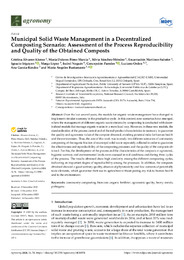Please use this identifier to cite or link to this item:
https://hdl.handle.net/11000/34190Full metadata record
| DC Field | Value | Language |
|---|---|---|
| dc.contributor.author | Pérez Murcia, Mª Dolores | - |
| dc.contributor.author | Álvarez Alonso, Cristina | - |
| dc.contributor.author | Sánchez Méndez, Silvia | - |
| dc.contributor.author | Martínez Sabater, Encarnación | - |
| dc.contributor.author | irigoyen, ignacio | - |
| dc.contributor.author | López, Marga | - |
| dc.contributor.author | Nogués, Isabel | - |
| dc.contributor.author | Paredes, Concepcion | - |
| dc.contributor.author | Orden, Luciano | - |
| dc.contributor.author | García Rández, Ana | - |
| dc.contributor.author | Bustamante, Maria Angeles | - |
| dc.contributor.other | Departamentos de la UMH::Agroquímica y Medio Ambiente | es_ES |
| dc.date.accessioned | 2024-12-23T12:59:36Z | - |
| dc.date.available | 2024-12-23T12:59:36Z | - |
| dc.date.created | 2023-12 | - |
| dc.identifier.citation | Agronomy 2024, 14, 54 | es_ES |
| dc.identifier.uri | https://hdl.handle.net/11000/34190 | - |
| dc.description.abstract | Over the last several years, the models for organic waste management have changed to implement circular economy in the productive cycle. In this context, new scenarios have emerged, where the management of different organic waste streams by composting is conducted with decentralized models that manage organic wastes in a more local way. However, in these new models, the standardization of the process control and of the end-product characteristics is necessary to guarantee the quality and agronomic value of the compost obtained, avoiding potential risks for human health and the environment. Thus, the aim of this work was to study two different scenarios of community composting of the organic fraction of municipal solid waste separately collected in order to guarantee the effectiveness and reproducibility of the composting processes and the quality of the composts obtained. For this, the development of the process and the characteristics of the composts at agronomic, hygienic–sanitary and environmental levels were assessed in real conditions and during three cycles of the process. The results obtained show high similarity among the different composting cycles, indicating an important degree of reproducibility among the processes. In addition, the composts obtained showed a good sanitary quality, absence of phytotoxicity and low contents of potentially toxic elements, which guarantee their use in agriculture without posing any risk to human health and to the environment. | es_ES |
| dc.format | application/pdf | es_ES |
| dc.format.extent | 13 | es_ES |
| dc.language.iso | eng | es_ES |
| dc.publisher | MDPI | es_ES |
| dc.rights | info:eu-repo/semantics/openAccess | es_ES |
| dc.rights | Attribution-NonCommercial-NoDerivatives 4.0 Internacional | * |
| dc.rights.uri | http://creativecommons.org/licenses/by-nc-nd/4.0/ | * |
| dc.subject | community composting | es_ES |
| dc.subject | biowaste | es_ES |
| dc.subject | organic fertilizer | es_ES |
| dc.subject | agronomic quality | es_ES |
| dc.subject | heavy metals | es_ES |
| dc.subject | pathogens | es_ES |
| dc.title | Municipal Solid Waste Management in a Decentralized Composting Scenario: Assessment of the Process Reproducibility and Quality of the Obtained Composts | es_ES |
| dc.type | info:eu-repo/semantics/article | es_ES |
| dc.relation.publisherversion | https://doi.org/10.3390/agronomy14010054 | es_ES |

View/Open:
agronomy-14-00054.pdf
1,11 MB
Adobe PDF
Share:
.png)
